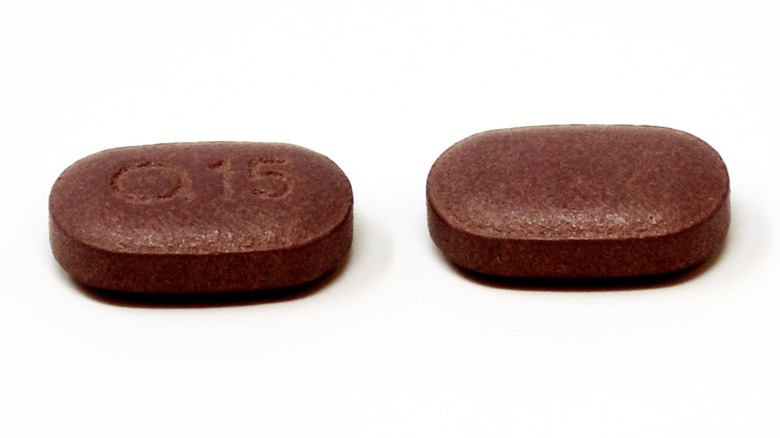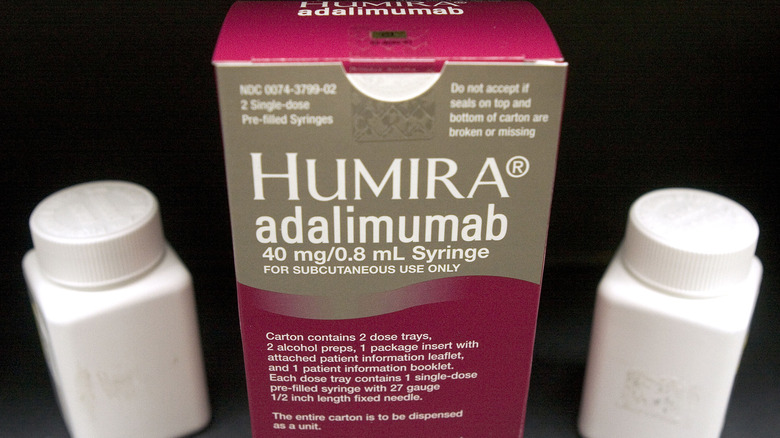The Rinvoq Commercial Explained: Drug Uses, Side Effects, And More
The once-daily pill Rinvoq, also known as upadacitinib, has a new commercial circulating for 2024. The ad portrays people with moderate to severe eczema attempting to enjoy different pastimes like horseback riding, roller skating, and playing guitar. As the commercial progresses, they begin enjoying these activities with ease. Initially approved by the U.S. Food and Drug Administration (FDA) in 2019, according to Drugs.com, you may have seen several Rinvoq commercials playing over the last few years. While this commercial centers on eczema treatment, Rinvoq provides symptom relief for seven different health conditions.
Prescription drug commercials can pack a lot of information into a short amount of time. This can sometimes leave viewers with a lot of unanswered questions. To help answer these questions, we've broken down the list of potential risks and side effects noted in the commercial and will explain how the drug works for those looking to learn more.
What is Rinvoq and what does it do?
Manufactured by AbbVie Inc., Rinvoq is an oral medication that falls into the drug classification of Janus kinase (JAK) inhibitors. Designed to be taken once a day, the company notes that Rinvoq relieves symptoms of moderate to severe eczema (atopic dermatitis), rheumatoid arthritis, ulcerative colitis, Crohn's disease, and active cases of psoriatic arthritis, ankylosing spondylitis, and non-radiographic axial spondyloarthritis. These last two conditions may not be as recognizable by name. Mayo Clinic experts explain that ankylosing spondylitis occurs when the spinal bones fuse due to inflammation. Also affecting the spine, in cases of non-radiographic axial spondyloarthritis, there will be no X-ray evidence of damage. Over time, the condition may progress into ankylosing spondylitis, which will alternatively show up in X-rays.
The active ingredient in Rinvoq is upadacitinib (ue-PAD-a-SYE-ti-nib), which works by reducing the body's immune system response and obstructing chemical messaging within the body related to inflammation. How long it takes for Rinvoq to work can vary. Some rheumatoid arthritis patients may notice symptom relief starting after seven days with more notable improvement occurring within 12 weeks. As highlighted in their 2024 commercial, those taking Rinvoq for eczema may feel significant itch relief within 48 hours and notice clearer skin within two weeks.
Rinvoq side effects
More common side effects of Rinvoq may include upper respiratory infections, headache, nausea, shingles, cold sores, muscle pain, cough, fever, acne, and increases in blood cholesterol levels, amongst others. Remnants of the tablet may also be observed in patients' stools, in which case they should reach out to their physician. The company further notes that for people taking Rinvoq for treatment of atopic dermatitis, cases of retinal detachment have been noted, and patients who experience any vision changes while taking the drug should contact their doctor promptly.
Rinvoq also poses the risk of more serious side effects. Because the drug impacts immune system functioning, such risks include the development of viral, fungal, or bacterial infections like tuberculosis (TB). Additional severe side effects may include the development of blood clots or tears in the lining of the stomach or intestines — particularly if taken with non-steroidal anti-inflammatory drugs (NSAIDs) or corticosteroids. Severe allergic reactions can also occur which may involve symptoms of hives, dizziness, difficulty breathing, or swelling in the mouth or throat. In the event of an allergic reaction, seek urgent medical attention.
Patients should refrain from eating or drinking grapefruit while taking Rinvoq as doing so may enhance side effects. A full list of side effects can be found on the Rinvoq website.
Rinvoq dosage
One of the most important things to note about Rinvoq is that it is designed for patients for whom other medication treatment options have been unsuccessful (via Rinvoq). This includes unsuccessful rheumatoid arthritis treatment with tumor necrosis factor (TNF) blockers, which are used to block the activity of TNF, a natural, inflammation-prompting protein in the body, according to WebMD. The same is true for people seeking symptom relief from moderate to severe eczema, as Rinvoq is designed for those who have not responded to other pill or injection treatments. For eczema treatment, specifically, Rinvoq may be prescribed for adults or children at least 12 years of age. The use of Rinvoq for the treatment of any other health conditions has not been approved for children.
Rinvoq comes in 15 milligram (mg), 30 mg, or 45 mg extended-release tablets. Prescribed doses are taken once a day and can be taken with or without food. The tablet must be ingested whole and should not be chewed, crushed, or split. If a dose is missed, do not double the dose. There is no need to take the missed dose if it's close to the time of your next dosage. For questions, concerns, or suspected poisoning call Poison Control at 1‑800‑222‑1222.
Rinvoq precautions
Rinvoq can increase the risk of certain health conditions, including cancers like lymphoma or skin cancer. This risk increases for people who smoke and these individuals may be more susceptible to lung cancer, in particular. To reduce the risk of skin cancer, patients taking Rinvoq are advised to limit UV-ray exposure and to wear sunscreen and protective clothing while outdoors. Patients may also need to have their skin routinely checked for signs of skin cancer.
Some additional precautions to be aware of pertain specifically to people at least 50 years of age with one or more cardiovascular disease risk factors. This includes an increased risk of heart attack, stroke, and death. Those who are allergic to upadacitinib (Rinvoq's active ingredient) or any of the drug's inactive ingredients listed in the company's Medication Guide should not take Rinvoq. Additionally, people who are breastfeeding should not breastfeed while taking Rinvoq or for six days after discontinuing the medication. Those prescribed Rinvoq should not give the drug to anyone else as doing so can be dangerous.
Avoid taking Rinvoq if you are on these medications
Like any medication, Rinvoq can have potential negative drug interactions. This is why it's important to inform your doctor of all medications you take and not just those that require a prescription. You will also want to mention any vaccines, herbs, supplements, or over-the-counter (OTC) medicines you take, including NSAIDs and vitamins.
Medications that may cause negative side effects in combination with Rinvoq include:
- Certain fungal infection medications like ketoconazole or itraconazole
- Some bacterial infection medications like clarithromycin or rifampicin
- Phenytoin (a drug used to treat neurological disorders)
- Drugs that impact the immune system such as azathioprine and cyclosporine
Some of these medications may either boost upadacitinib levels in the body, minimize Rinvoq's effects, or make a patient more prone to infection. Patients taking Rinvoq should also not receive any live vaccines. For a more comprehensive list of potential drug interactions, visit Rinvoq's Medication Guide if you would like to learn more.
How much does Rinvoq cost?
The company states that over 80,000 Americans have been prescribed Rinvoq for rheumatoid arthritis (RA) since the drug was first FDA-approved in 2019. More than 95% of people with health insurance or Medicare Part D plans receive some degree of coverage for Rinvoq.
As of the start of 2024, the list price for a 30-day supply of the drug is $6,431.21 (via Rinvoq). Depending on one's health insurance plan, patient costs will vary. People with employer-provided health insurance may pay $5 a month when also using the Rinvoq Complete Savings Card. Those with Medicaid may pay less than $20 for a 30-day supply of the drug. For this same supply, Medicare Part D recipients may pay between $0 to $2,017. Those who receive Medicare Low Income Subsidy (LIS) may pay $11.20 per dose. Alternatively, patients who receive health insurance coverage through the VA, DOD, or TRICARE are encouraged to call 1-800-2RINVOQ (1-800-274-6867) to speak with a specialist. People who do not have health insurance can visit AbbVie.com/myAbbVieAssist to learn about potential financial assistance programs.
What's the difference between Rinvoq and Humira?
Rinvoq may be an option for patients who are unable to take, or did not benefit from, other treatment drugs for inflammatory conditions. This includes the TNF-alfa inhibitor Humira (via Drugs.com). As a JAK inhibitor, Rinvoq does have its differences and may potentially benefit patients who have yet to find symptom relief.
While both drugs are classified as antirheumatics, they do differ in terms of their number of drug interactions, dosage forms, half-life duration, and more. For example, Humira is reported to have a total of 475 known drug interactions. Rinvoq is reported to interact with 545 different medications. Additionally, Humira is taken in the form of an injection while Rinvoq is taken as an oral tablet. The two drugs also have differences in their half-life, or the amount of time it takes for drug levels in the body to reduce by half. For Humira, this takes 480 hours compared to the half-life of Rinvoq which is 14 hours.
Which medications may be best suited for a patient will always vary on a case-by-case basis and ultimately be determined by a healthcare professional based on many different factors.







